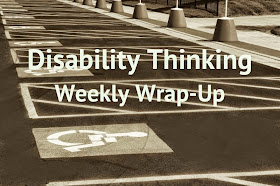 There are 16 episodes of the Disability.TV Podcast so far. I’ve had some terrific guests to talk about some interesting TV shows that have disabled characters. Some we loved, some we liked, some were disappointing, and some I change my mind about approximately twice a month. I have also received some really interesting feedback on the episodes so far, that I think will help me make Disability.TV a better, more engaging podcast. I’ll have more to say about that next weekend, when I plan to post the 17th podcast episode.
There are 16 episodes of the Disability.TV Podcast so far. I’ve had some terrific guests to talk about some interesting TV shows that have disabled characters. Some we loved, some we liked, some were disappointing, and some I change my mind about approximately twice a month. I have also received some really interesting feedback on the episodes so far, that I think will help me make Disability.TV a better, more engaging podcast. I’ll have more to say about that next weekend, when I plan to post the 17th podcast episode.
Since I have lost the original calendar of episode topics I had all planned out, now is probably a good time to reassess where to go from here. What other TV shows should I discuss next? Are there other topics related to disability on TV worth exploring? Which topics are listeners most looking forward to?
To answer that last question, I have put up an online survey at SurveyMonkey. It would help a lot for as many people as possible to complete the survey so I can make my plans with some sort of direction.
The survey has two parts:
First, which TV shows with disabled characters would you like me to cover? Here is a list of possibilities, with a note on the disabilities portrayed:
Autism / Asperger’s
Amputation, chronic Illnesses
Various physical deformities
Cerebral Palsy
Mobility impairments
Mobility impairments, chronic pain, drug addiction
Various disabilities over 5 TV series
Multiple Sclerosis, Deafness / Sign Language use
Intellectual disability (unspecified, not clear?)
Various physical deformities
Blindness
Paraplegia / wheelchair users
Various disabilities
Cerebral Palsy
Family that includes several Little People
Down Syndrome
Cerebral Palsy, stuttering
Second, which other topics would you like included in the podcast. For example:
Familiar disability tropes and clichés.
Disability in comedy.
Disability in sci-fi and fantasy.
Disability in horror.
Disability on reality shows.
Disability on shows for kids.
Supporting and guest characters with disabilities.
Cognitive impairment on TV.
Sensory impairment on TV.
Physical impairment on TV.
Mental illness on TV.
Aging on TV.
What is "representation" and why does it matter?
Should disability depictions on TV be realistic or idealistic?
How important is it to cast disabled actors in disability roles?
How important it is to for portrayals of specific disabilities to be completely accurate?
In each section of the survey, you can also make your own suggestions of TV shows and topics.
I’m looking forward to getting lots of feedback and suggestions!















